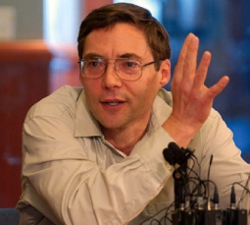 In this preview of the second chapter from Climate Smart & Energy Wise, Teaching (and Learning) About Climate Challenges and Energy Solutions, we begin with the story of Nobel Prize winner in physics Dr. Carl Wieman, now at Stanford and chair of the Board on Science Education at the National Academy of Sciences.
In this preview of the second chapter from Climate Smart & Energy Wise, Teaching (and Learning) About Climate Challenges and Energy Solutions, we begin with the story of Nobel Prize winner in physics Dr. Carl Wieman, now at Stanford and chair of the Board on Science Education at the National Academy of Sciences.
After winning the Nobel prize Wieman became keenly interested in science education while at the University of Colorado at Boulder.
Immersing himself in the challenges of effective science education, Wieman soon realized that science education and related research is challenging--and not very well funded. Eventually he led the development of a collection of online interactive tools for teaching physics and chemistry available through the Phet website, and encouraging the use of clicker technology in science classrooms.
In 2010, he became the White House's Office of Science and Technology Policy Associate Director of Science. There he became a driving force behind the Energy Literacy document led by the Department of Energy, which identifies the essential principles and fundamental concepts of energy.
Matthew Inman, an Einstein Fellow working for the Department of Energy and charged with leading the development of the Energy Literacy framework, worked closely with Dr. Wieman. He recommended adding a "Guiding Principles for Teaching and Learning" page to the document, which drew from six guiding principles laid out in the National Research Council’s document “A Framework for K-12 Science Education.”
The guiding principles in sum:
- People are born investigators and learners
- Effective learning focuses on a core set of ideas and practices
- Understanding develops over time
- Literacy requires both knowledge and practice
- Connection to interests and experiences enhances learning
- Educational opportunities must be equitable and accessible to all
Of course, executing these principles is a challenge, particularly for topics such as climate and energy.
What practical knowledge should students master? Children must be prepared to communicate, problem solve, and use diplomacy and science to overcome challenges. No small task, to be sure.
How does the U.S. compare with other countries when it comes to climate and energy literacy? No surprise, the U.S. doesn’t fare well. A study by Eric Jamelske and colleagues study found that U.S. students were significantly less likely to believe human-caused climate change is occurring than their Chinese counterparts, and were also less convinced of the consensus among climate scientists on human contribution to climate change. While both groups support an international agreement to address climate change, support among Chinese students was stronger.
One key step toward improving our knowledge gap: teach climate and energy topics across the curriculum. This is happening on an ad hoc basis in some K-12 schools and is beginning to percolate into higher education as well, where the insights of psychology, sociology, philosophy, and business, and the broad arts and humanities can be added to enrich the essential climate literacy.
When and wherever climate change and related topics are taught, the key is making them relevant to students and that means making climate change personal and local. Unfortunately, climate change, when it is taught at all, is often presented as abstract and overwhelming, global and grim.
Education is inherently an optimistic endeavor, and when it works well, it helps prepare young people for the future by unpacking and deconstructing the abstract, the global and grim, making them meaningful and manageable.
To connect with students, climate change education must ultimately be hopeful. The truly alarming aspects of global change--and our utter unpreparedness--must be acknowledged without any sugar coating. To do anything less is a disservice to our children. But it should not be the only or even primary message, and it should be done skillfully.
Hope--through relevant solutions and responses--must be integral to the overall equation. We're not talking about wishful thinking, but rather, hope motivated by an eagerness to learn by doing, to tackle challenges, to venture into the unknown motivated by a sense of urgency.
Next up: Syncing with the Standards.
Photo courtesy of the University of Colorado at Boulder
